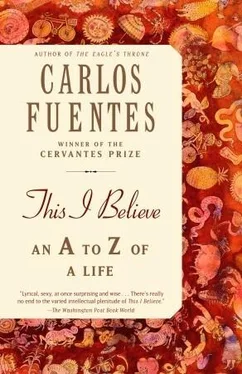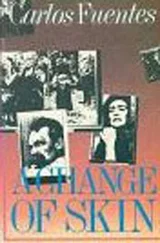We are on earth because this is where we were born and this is where we will die. But we are also in the world, which is not quite the same thing. In El naranja ( The Orange Tree ), the women to whom I give voices in my description of the walls of Numantia are besieged by death and famine, and they watch as the overwhelmed world — though not the earth — disappears. The earth remains while the world disappears. It makes no difference. The world (construction) dies, but the earth (instruction) is transformed. Why? Because the word says so. Because we do not lose sight of the experience of the word. The world shows us that we are human beings, subject to its experience. The Earth hides us for a brief moment, only to give us back the power to recreate the world. “We disappear from the world. We return to Earth. From there we will emerge to frighten everyone.” In other words, we will speak.
Calderón de la Barca poses the defining question of experience in La vida es sueño ( Life Is a Dream ), the greatest work of Spanish drama: “The greatest crime of man is that of having been born.” Segismundo, the protagonist of the play, compares himself to Nature who, having less soul than he, has more freedom. Segismundo feels this absence of freedom as a deficiency, as if he hasn’t fully been born: “Before being born, you died.” But isn’t it a greater crime not to have been born at all? Calderón liberates us to the intimate beat of dreams. Dreaming as compensation for all that experience has denied us. We dream in both forward-time and backward-time. We desire in both directions. No, it is better to have been born. And each of us must examine the reasons why it was worth coming into the world at all, and ask ourselves tirelessly and without hope of an answer the great questions of experience:
How are freedom and destiny related?
To what extent can each one of us personally shape our own experience?
What part of our experience is change and what part permanence?
To what degree does experience depend upon necessity, coincidence, liberty?
And why do we identify with the ignorance of what we are: the union of body and soul? And still continue to be precisely the thing we do not understand?
I do not know anything of my own genealogy beyond my greatgrandparents. On my mother’s side, my great-grandfather Teodoro Rivas emigrated from Santander to Sonora during the second half of the nineteenth century and settled down in the beautiful city that is a bountiful garden amid the deserts of the Mexican north: Álamos (a city of silver ghosts, Indians made of smoke, and calendars of saints and crosses), where he eventually became the director of the treasury of Sonora. I know very little of his descendants, because my maternal grandmother, Emilia Rivas Gil, was chary when it came to dispensing family information; it was as if she was trying to concentrate and protect a circle devastated by pain and death. She was married to Manuel Macías Gutiérrez and they spent their idyllic early days in the port of Mazatlán, where my mother was born next to the Paseo de las Olas Altas (the Boulevard of the Tall Waves). The photographs from the turn of the twentieth century speak volumes: my grandmother is a small, dark woman with an aquiline nose and black eyes, penetrating and resolute. My grandfather is a tall, white-skinned man, very dapper, very elegant, all careful attention to detail and grooming in every aspect: the waxed moustache, the discreet gaze, the elegant frock coat and cravat. Encircling them like a bouquet of white flowers are his four daughters, all dressed in white. Three of them (María Emilia, Carmen, and Sélika) have dreamy expressions on their faces, while my mother, Berta, has the same resolute look as her mother. Before long, those luminous white clothes would be exchanged for funeral garb. Sélika died of scarlet fever at the age of ten.
And my handsome grandfather — so manly, so distinguished— fatally and mysteriously contracted the most feared of diseases: leprosy. His young wife and three daughters were forced to witness, with a pain that admitted neither pity nor rejection, the harrowing deterioration of their husband and father. I see them in the photographs taken after my grandfather’s death, all of them dressed in black, with bandannas tied around their temples and their long black hair straightened. An honest, capable merchant, my grandfather left no fortune behind. I met his brothers and my aunts, his nieces. They were all identical. The old men were tall, pale as ghosts, and with the parchment skin of old people, while all the young girls had skin like wax. One of them, who had an imposing physical presence, was a nun. My widowed grandmother was forced to support her three daughters. As a girl she had been friends with Álvaro Obregón, in Sonora. When Obregón became president, he appointed my grandmother inspector of schools, and the minister of education, José Vasconcelos, gave her an active role in the remarkable literacy campaign that, in 1921, confronted the grim fact that 90 percent of all Mexicans were illiterate.
Once her three daughters were married, my grandmother was able to retire and accept the loving support of the Fuentes, Romandía, and Juárez families. The relationships Emilia maintained with her sons-in-law were often every bit as tormented as one would have expected, considering her strong character. When it came to her daughters, her attitude was consistently leonine, for she was the eternal guardian of her pride. And with her grandchildren she became a focal point of happiness, jokes, reminiscences. She was a link to a past that was growing more and more remote but that she, with great humor, returned to us intact: the days of Porfirio Díaz, the revolution, Mazatlán, the poem by Enrique González Martínez inscribed in her autograph book, her forgotten predilection for the piano, her peculiar insistence upon watching movies in black-and-white, and then dreaming of them in Technicolor. .
Similar in temperament, though far more severe in character, my other grandmother, Emilia Boettiger, was the descendant of German immigrants who hailed from the city of Darmstadt in the Rhineland. My great-grandfather Philip Boettiger, a fervent supporter of Ferdinand Lasalle, left Germany when Lasalle joined forces with the Iron Chancellor Otto von Bismarck under the misguided conviction that only an alliance between the Prussian aristocracy — the Junkers — and the proletarian socialists could save the country from the unseemly avarice and presumptuousness of the bourgeois arrivistes. In reality, the socialist Lasalle was an elegant revolutionary driven by the profound disgust he felt for the vulgar manners and boorish ways of his rival, Karl Marx. In any event, the Boettiger brothers set sail for the Americas and arrived at the port of New Orleans. There, their paths diverged. The older brother went to the North, to Chicago, where he became a prosperous businessman whose grandson married Anna, the daughter of President Franklin D. Roosevelt. My great-grandfather went to Veracruz, and on arrival fell in love with the town and lagoon of Catemaco. He went on to establish a prosperous coffee business there, had three daughters (my grandmother Emilia and my great-aunts María and Luisa), integrated his little mulatto daughter, Ana (born to another woman), into the family, and forbade his family to speak German. He wanted to be Mexican, to leave the Old World behind.
My paternal grandfather, Rafael Fuentes Vélez, was the son of Carlos Fuentes Benítez, a businessman who had emigrated from the Canary Islands and who entered into matrimony with a beautiful criolla woman, Clotilde Vélez, who would one day be assaulted on the Camino Real. A bandit asked her to hand over her rings and when she refused to give them up, she lost them in the barbaric slice of a machete. My grandfather grew up in the port of Veracruz and met my grandmother at the Candelaria festivals in Tlacotalpan. He was forty years old; she was seventeen. The photographs reveal a short man with an aquiline nose and penetrating eyes beneath a pair of extraordinarily arched brows, like twin circumflex accents, that made him appear as though he were perennially angry, even diabolical. My grandmother Emilia, on the other hand, was like a Gothic statue: tall, thin, severe, and blessed with a profile that was perfect and straight, bestowing a noble, eternal symmetry upon her face.
Читать дальше












